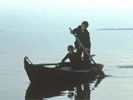Eye For Film >> Movies >> The Return (2003) Film Review
The man sleeps on his back in their mother's bed, a dark and threatening presence. The children stare, expecting a demon to rise up out of his body and devour them. Who is he? Their father? After all these years? They don't remember him. It's been so long.
Ivan (Ivan Dobronravon) rushes to the attic and finds an old photograph in a trunk. The man in the picture, with their mother and two babies, is unsmiling, black haired, not unlike the stranger in the room downstairs.

Mystery surrounds this enigmatic story. The location is northern Russia, beyond the gaze of reformers and developers. Everything is in decay, the buildings, the streets, the empty factory. Ivan is 12 and his brother Andrei (Vladimir Garin) older. Their mother (Natalia Vdovina) is beautiful, like no one else in this ruined place, and yet forgotten, somehow wasted.
Ivan will not be told. He fights his mother, he fights his brother. There is an anger in him that protects what he knows, what he feels. You can call it pride; he calls it his own. He won't be ordered and he won't be shown. His father (Konstantin Lavronenko) says little, yet demands obedience. Andrei listens and is afraid of his imposed authority. Ivan looks at him like a thief.
The film is a journey, a search. The father takes the children on a long drive to a distant, isolated island. Ivan wants to fish, explore, take the boat out. His father makes rules and is fierce when they are broken. He is looking for something. Buried treasure? The boys recognise their predicament and are forced to trust this man whom they don't know. Terror stalks them. They feel it, without understanding it.
Andrey Zvyagintsev's debut film won top prize at the Venice Film Festival. The cinematography is astonishing, almost monochrome, capturing the darkness at the heart of the story, using close ups to great effect. Not since Tarkovsky has the bleak face of Russia been so exposed.
The sense of dread creates a tension that never goes away. It is inexplicable and surrounds the brooding figure of the father, as much as the ominous silence on the island. Somewhere soon tragedy will strike. How? From where? Andrei watches his father and wonders why he brought them here. Ivan won't be told. His obstinacy becomes the fuse in their battle of wills.
It would be wrong to make comparisons with early Polanski, or the Eastern European classics of the Fifties. Zvyagintsev has his own vision. This is a unique work and the force of Dobronravon's performance leaves a lasting impression.
Reviewed on: 25 Jun 2004





















